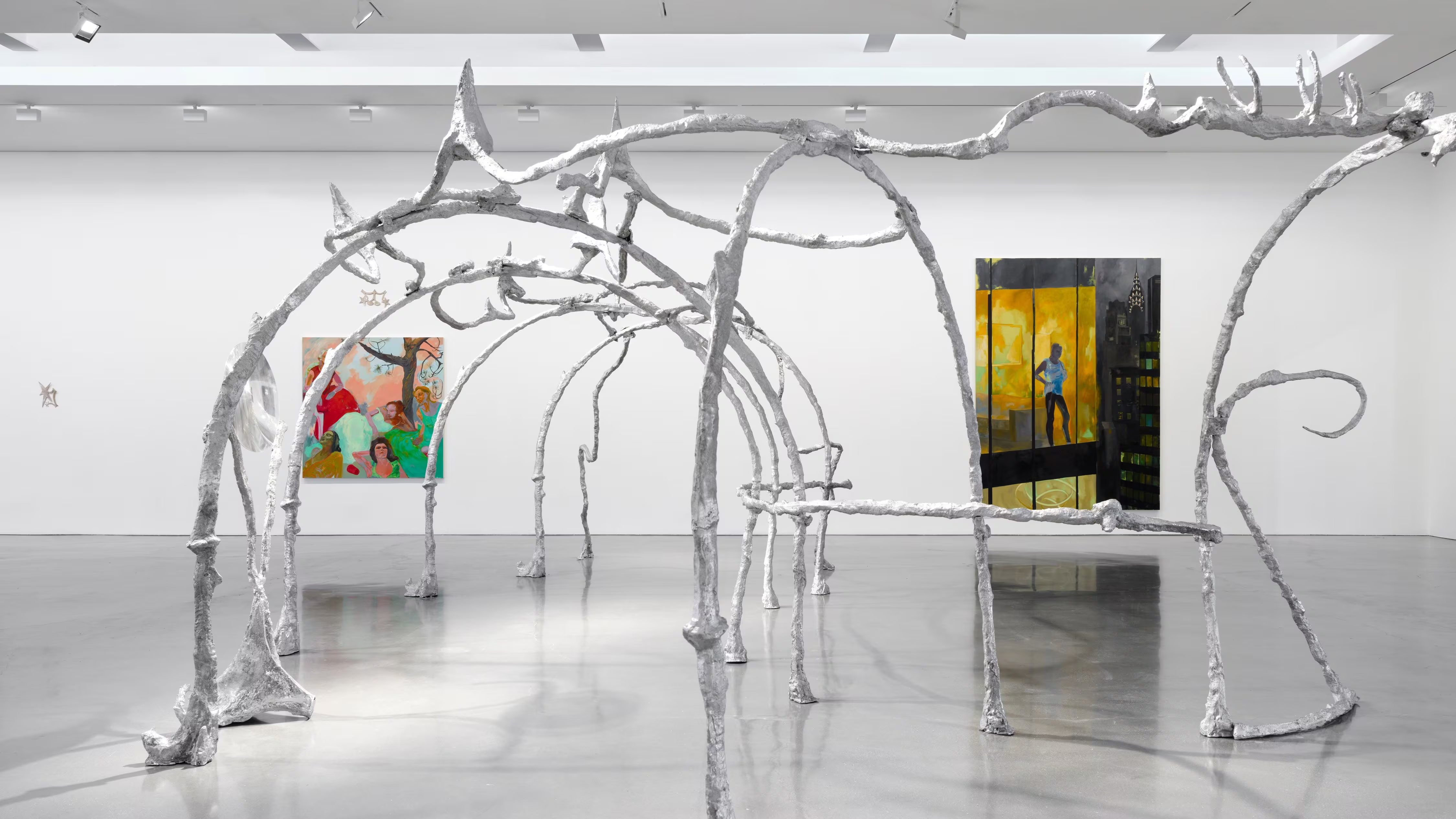
In a Gilded Age ballroom of the Shangri-La in Paris, Naomi Campbell parades across the opulent catwalk in an open, black shirt layered underneath a blazer with idiosyncratically constructed padded shoulders. Following her are models wearing a cascade of designs: semi-inflated halter necks, tightly twisted fabrics, asymmetric gowns, and all sorts of mixed densities and exaggerated forms—an avant-garde distortion and otherworldliness introduced to this antiquated setting. This is the esoteric, unsettling, and elegant debut of Torishéju Dumi, whose eponymous label debuted at Paris Fashion Week last year like an alien invasion. Gabriella Karefa-Johnson styled the looks, fashion industry vet Lucien Pagès ran front of house, and glossy magazine editors sat front row. More than just a seasonal collection, though, it’s an entire new world that the young designer seeks to build.
But such a catapult into the world of high fashion didn’t always seem in the cards for Dumi. When she graduated from Central Saint Martins with a master’s degree in menswear design in 2021, she wasn’t shortlisted for that year’s LVMH Prize nor any other flashy competition of the kind. Early-career award shortlists are often decisive for emerging designers, setting them up with the connections, press coverage, and drumming up a cult following as buzzy ones-to-watch all in the lead up to that a high-profile debut.
“If they put too much pressure on you to actually create something,” Dumi pauses, speaking to me from her North London home. “I’d rather just try and make my own way.” For Nigerians, naming is deliberate as it is considered prophetic, and in the Itsekiri language (from the ethnic group her mother is from) “Torishéju” roughly translates to “God’s timing is the best.” Her timeline was always going to be between herself and God, not anyone else.
As such, Dumi is always thinking about where she’s going, and where’s been. She was born to a Nigerian mother and a Nigerian-Brazilian father, and raised in North-West London until she was 8 years old. That was when her family relocated to Hertfordshire and then, later, Buckinghamshire. Her parents divorced when she was 15, and her father passed away around a year later, leading to some disconnection from her Brazilian heritage, though she is in possession of images from her father’s youth that are a source of creative inspiration. In the serene but pedestrian countryside, she recalls repeatedly “being the only Black person in my class.” Much of Dumi’s design motivation now is to show who she truly is in spite of whatever projections and preconceived notions are made of Black women’s identities. That is to say, having been raised in a majority white environment, she’s met with attitudes that attempt to disqualify her from Black identity. She recalls: “Because of the way I’ve grown up, I’ve always been asked ‘Why do you speak like that?’ or ‘Why are you like this?’”

At 32, the designer is fresh faced when we speak. Her immaculate cheekbones shift with every word, and her hair is dyed a light brown. In contrast to the dramatic visuals of her eponymous label, she is dressed in a simple black, low-cut top. “I wear basics!” she exclaims. “Cut off three-quarter leggings and a hoodie, that’s my statement piece.” Perhaps dressing down is a relief from the more splendid and glorious garments of her upbringing in a strict Catholic household. “In Nigerian culture, your children are like your purse. You have to have them immaculate whenever you go to functions, and my mum always said to me, it was better to be overdressed than underdressed.” Dumi’s mother would dress her up with bows in her hair and “really, pretty dresses,” only for her daughter to eventually disappoint her by choosing to wear black robes when she could.
Still, Dumi is the maverick of her family: Most of her relatives are in the law sector, and she recalls visiting New York to work for her uncle’s best friend, filing motions and attending Supreme Court hearings just to get a feel of the business. But her creative instincts ruled over and won. She first chose fashion as an outlet for the vortexes and galaxies that occupy her mind. She describes her work as “an obsessive study of shape, form, and texture.” When faced with the beauty of nature or the curves and bends of a fascinating sculpture, her imagination overtakes her and she starts to build whole worlds in her head. Luckily, her family supported her. They also passed down a good eye for fashion and appreciation for clothes. Her grandfather, the noted lawyer Godfrey Etikerentse, was an early fashion inspiration for his wonderfully crisp outfits: his house boys and girls in Nigeria would iron all of his clothes before his travels. “When he comes to England, he wears a bow tie and a really beautiful shirt or really nice tailored trousers,” describes Dumi. “He has random items from Japan and Korea. If you didn’t know him, you’d think it’s quite flamboyant, but it’s just very crisp. When he’s in Nigeria, he’s always in an agbada.”
Indeed, Dumi’s Nigerian heritage is threaded into her clothes—with wrap-style gowns in her collections that take influence from lappa clothing, and extensive conversations with relatives in Nigeria that inform many of her design choices. Her Mami Wata capsule collection, which she released in 2023, is an ensemble of surrealist, punky black clothing that captures the motion of fabric submerged underwater. It taps into emotions like fear and mythological themes, taking its name from a water spirit and voodoo goddess recognized in cultures across West, Central, and Southern Africa. Dumi first learned of the deity from a Nollywood film she watched as a child. “A lot of Nigerian movies have a lot of witchcraft and juju. They scared the hell out of me,” says the designer. She caught a lot of heat from her aunts and uncles who thought that the collection was blasphemous. But Dumi, still a practicing Catholic, believes that her strong connection with God means having no fear of or qualms about approaching the traditional or stigmatized. Curator Andrew Bolton agreed and acquired seven Mami Wata pieces for the Metropolitan Museum of Art, two of which were on view in “Sleeping Beauties: Reawakening Fashion” at the museum’s Costume Institute presentation this year.
“In Nigeria, we create beautiful tailoring... We can create stuff that has this uncanny, weird but ethereal arrangement. Not everything has to be scandalous and Americanized.”
— Torishéju Dumi
In spite of her successes, Dumi has the disposition and manner of someone who is never quite satisfied, one who never wants to risk complacency or fall behind. After her debut at Paris Fashion Week, Dover Street Market and Comme des Garçons president and CEO Adrian Joffe reached out for a meeting. For the designer, this was a moment of dreams, but she felt like she had to let him down. “I said no, because as soon as the show ended we went straight back to the Eurostar,” she recalls. “I had no money to stay in Paris, so I had no business staying there.” Fortunately, Joffe made plans to visit London soon after, and when he did Dumi hired a studio space to present her collection to him. The investment paid off. Joffe took a shine to the designer, and all seven Dover Street Market stores bought the collection.
“I’ll sleep when I’m dead!” she laughs today. “I need to work fucking harder! If you for a second sit back and congratulate yourself...no! I’m not at a stage where I can congratulate myself. It will take many more years.”
As a fellow Nigerian, I recognize that mentality of relentless, hard work. When you’re raised with the mantra that you need to work “twice as hard” when you’re a minority in a white country, it can be difficult to shake off. I raise this concern with her—that I believe our dissatisfaction with achievement is something that is deeply unhealthy in Nigerian culture—and we laugh together.
But she is continually motivated by the desire to make her mother and grandfather happy. Through her label, she says she also wants to “put Nigeria on the bloody map!” After all: “In Nigeria, we create beautiful tailoring... We can create stuff that has this uncanny, weird but beautiful and ethereal arrangement. Not everything has to be scandalous and Americanized.” Though she doesn’t name her, this sentiment recalls Mowalola Ogunlesi’s controversial Summer/Spring 2024 collection, which featured a miniskirt with a print of the Saudi Arabian flag.

As far as her own work, Dumi’s upcoming collection remains a mystery for now. She refuses to give away even the slightest hint, not even a little sneak peak for her Nigerian brother! But all indications are that it will continue Dumi’s obsessiveness. “When I look at my work for too long, I’m like, This is a bit too much. But I’m just obsessed with it. I’m obsessed with what I do.” She also wants to keep creating “weird” looking things, being abstruse, and making shirts, jackets, and trousers look uncanny and abnormal through techniques like sleeve inversions and horned shoulders.
She has an abundance of material for her future collections, too. Dumi’s brand is an important champion of sustainability, and future collections will make the best use of fabrics she’s been gifted from contacts such as Craig Green, the brand Alexander McQueen, and more. “If you look deep enough on the Internet, you find people’s email addresses,” she jokes. What’s most urgent for the designer is to express that wild imagination. It is not about the riches, or about awards, or about the celebrities like Zendaya who wear the brand, but about her abundant creative reflections, her deep love of research, and her aspiration to create all encompassing visions through designs. Dumi has reached incredible heights, but she is only dedicated to fashion so long as it continues to be a medium for imagination. It’s an essential capacity to retain in the world we find ourselves in. “It’s awful the stuff that’s going on in the world right now,” she says. “I think the one thing that we can hold on to is dreaming.”
















.avif)


_result_result.avif)



.avif)

_result_result.avif)

_result_result.avif)
.avif)

_result_result.avif)


_result_result.avif)


.avif)




.webp)

.avif)















%20(1).avif)
.avif)




.avif)










.avif)


.avif)





















.jpeg)

.avif)

_11%20x%2014%20inches%20(2).jpg)







.avif)

.jpg)

%20(1).jpg)
.avif)
.jpg)

.jpg)
.webp)


.webp)



.webp)


.webp)


.avif)












.avif)
.avif)












.avif)



.avif)




















-min_result.avif)









.avif)







3_result.avif)
_result.avif)






_result.avif)




.avif)




.avif)













_result.avif)




%2520(1)_result.avif)
_result.avif)


_result.avif)

_result.avif)



.avif)

.avif)






.avif)














.avif)


_result_result.avif)
















-min_result.avif)






.avif)
.jpg)
















_result.avif)

.avif)


.avif)







.avif)





.avif)

_result.avif)



.avif)












.avif)


.avif)














.avif)




.avif)








.avif)

.avif)

.avif)



.avif)


.avif)




.avif)

.avif)

.avif)
.avif)
%20(1).avif)
.jpg)

%20(1).avif)








.avif)
.avif)

.avif)






.avif)


.avif)
.avif)



.avif)
.avif)
%20(1).avif)

.avif)
.avif)



















.avif)
.avif)
